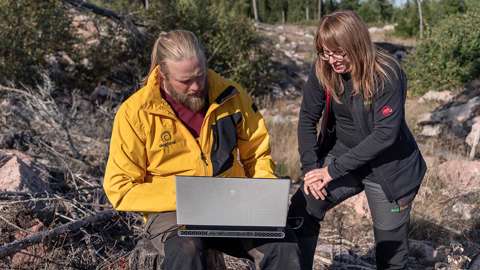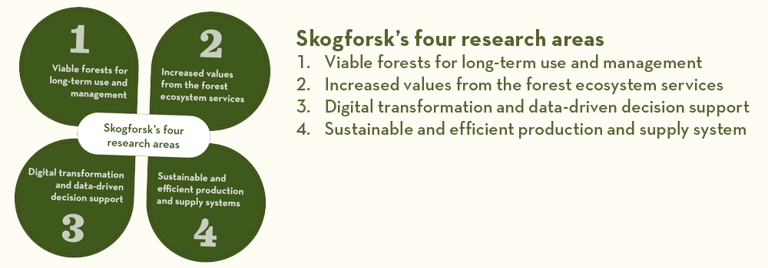Research areas

Forests are one of Sweden's most important natural resources – not only for timber and energy, but also for biodiversity, climate benefits, recreation, and much more. But forestry faces major challenges: climate change, changing societal expectations, new technological possibilities, and increasing demands for sustainability. To address this, Skogforsk has defined four strategic research areas that will guide its work from 2025 to 2028. These areas focus on developing knowledge, technology, and methods that benefit the entire forestry sector – from forest owners to industry, and from environmental values to social sustainability.
1. Viable forests for long-term use and management
Forests should be healthy and productive – both today and in the future. Through research in tree breeding, climate-adapted silviculture, and resilience against damage, Skogforsk contributes to future forests being both productive and robust. The focus is on combining high growth with biodiversity and social values. This includes everything from developing more resilient trees to creating management systems that work in a changing climate.
2. Increased values from the forest ecosystem services
Forests provide more than just timber – they also offer recreation, clean air, biodiversity, and support for reindeer herding. In this research area, Skogforsk works to find ways to value and balance the forest's many benefits. How can we create new business models that benefit both the economy and the environment? How can different forest uses coexist? This area develops knowledge and tools that enable wise decisions for both people and nature.
3. Digital transformation and data-driven decision support
Forestry is becoming increasingly digitized. By harnessing new technologies – such as AI, sensors, and digital mapping tools – forestry can become smarter, more efficient, and more sustainable. Skogforsk develops digital tools that support decision-makers in everything from silviculture to logistics. The goal is to enable more people to make well-informed decisions, even without years of experience, and to make new technology accessible to everyone in the forest sector.
4. Sustainable and efficient production and supply systems
For forestry to be profitable and sustainable, efficient machinery, smart logistics, and fossil-free transport are essential. Skogforsk is developing technology and systems that make harvesting, regeneration, and transport both more environmentally friendly and safer for the people working in the forest. This includes everything from autonomous forest machines to improved infrastructure and planning – all to ensure the right raw material is delivered at the right time, in a climate-smart way.
Read more about our research areas in the Research and Innovation Strategy.



